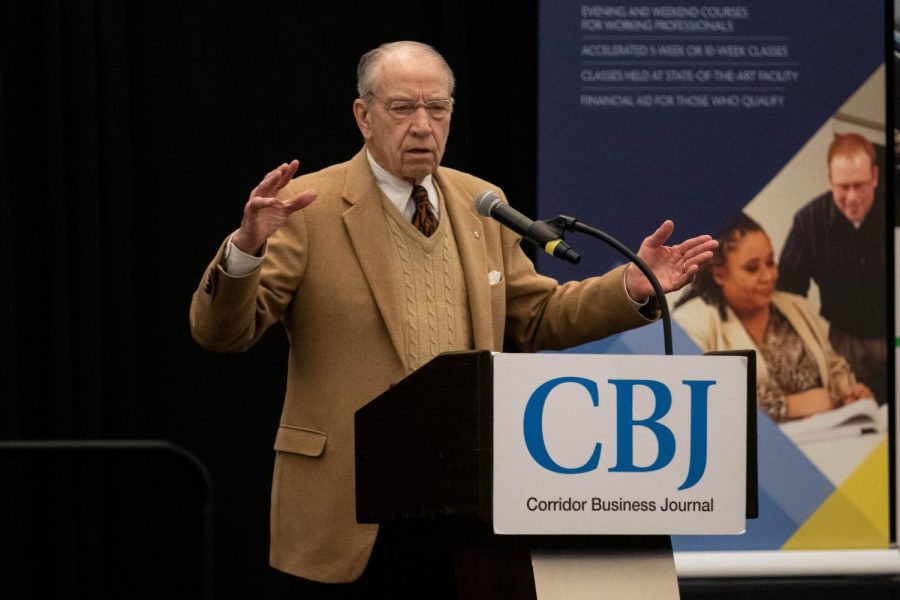Editorial | Iowa needs a better ruling on Supreme Court vacancy
Our state’s two senators have said they support filling the Supreme Court vacancy before the election, revealing the structural obstatcles in the way of realizing American democracy.
Sen. Chuck Grassley (R-Iowa) speaks about lowering prescription drug prices during the Corridor Business Journal Health Care Summit at the Coralville Marriott Hotel and Conference Center on Feb. 14.
It wasn’t too long ago Iowa’s senior senator, Chuck Grassley, said he wouldn’t consider a Supreme Court nominee in the year leading into an election.
He should’ve kept to his 2016 words.
Hypocrisy is nothing new in politics. Flip-flops, half-truths, and outright lies are part of the reality of writing about our elected officials. But Iowa’s senators are taking a new, more egregious step by holding their party line on the recent vacancy in the highest court in the land.
The evidence
And it didn’t have to be this way. The story has been recounted many times, but it’s important to lay out the facts for the record.
In February 2016, a Supreme Court seat became empty. President Obama exercised his constitutional duty to nominate a new justice, Judge Merrick Garland, who required confirmation from the Republican-held Senate. Majority Leader Mitch McConnell led his party — including Grassley and Ernst — in refusing to even hold hearings for the nominee. Our senior senator, as chairman of the Senate Judiciary Committee, attracted national attention for leading the procedural charge in this effort. They reasoned that the nomination was too close to the election, then nine months away.
“The American people shouldn’t be denied a voice,” Grassely said at the time. “This year is a tremendous opportunity for our country to have a sincere and honest debate about the role of the Supreme Court in our constitutional system of government.”
Similarly, Ernst supported Grassley’s position and voted to block Garland until there was a new president to make the appointment.
Republicans said they were following the “Biden Rule,” which was a 1992 suggestion from then-Sen. Joe Biden that election-year nominations were inappropriate. (There was no such actual vacancy at the time.)
So, the GOP had a will, stop the Obama nominee, and a way, a convenient albeit unused idea from Obama’s own vice president.
There’s not much value in relitigating the arguments of a fight from more than four years ago. The point is that a precedent was set.
The argument
Most institutional precedents last decades in American government; this one lasted four and half years.
We’ve got six weeks until the election and four months left in the current presidential term. Using the Republican argumentation from the Obama years, we’re way too close to voters picking the country’s next leader for there to be a new face on the bench.
In 2018, Grassley defended the newly enshrined process telling Iowa Press, “You can’t have one rule for Democrat presidents and another rule for Republican presidents.”
The senator has pointed to a 2016 letter penned by fellow legislators to McConnell emphasizing that during that election, unlike this year, Capitol Hill operated under a divided government with a Democratic White House and a Republican Senate. And the GOP expanded its majority in 2018 under a president of their own party.
“While there was ambiguity about the American people’s will for the direction of the Supreme Court in 2016 under a divided government, there is no such ambiguity in 2020,” Grassley says now.
But the solid Republican leadership doesn’t grapple with an election year in which voters could vote out the president in less than days, a much shorter time frame than during the 2016 cycle.
If Grassley could veto a presidential pick for the highest court in the land nine months ahead of the election, why is it justified that one can be nominated just seven weeks ahead of when voters go to the polls?
The ruling
This decision is more than senatorial power grab or political hardball. The legitimacy of the federal government is under threat. Perhaps that’s what the Republicans want, but for the party that claims to champion “law and order,” it’s impossible to see an ethical throughline.
Are Iowans supposed to simply accept the decisions made by a Supreme Court with multiple ill-gotten seats? Are Iowans supposed to agree that judicial review was legitimately impartial and not crudely partisan?
The profound damage in which Grassley and Ernst are complicit is undeniable. We don’t expect much different, but it can’t pass by quietly.
Aside from the drama of Washingtonian politics, there are some lessons to take for those of us out here in the Hawkeye State.
Our form of government is severely broken in several ways. This past summer, Iowa and the country have heard incessant calls for racial justice with the demanded solution being systemic revolution. Countless Americans have been shut out of the halls of power, with very few people having all the control.
It’s striking to recognize that the current political crisis was caused by the death of one 87-year-old woman. This is not how a society should organize itself.
As Grassley and Ernst join in the latest strike against democracy, we must — as Iowans and Americans — face forward to construct a better country.
Let’s rebuild and realize American democracy. Whether that includes more justices to dilute partisan influence; whether it means a more representative Senate with statehood for Washington, D.C. and imperial territories; whether it means a more wholesale reimagining of American government — we can’t continue on the path our representatives have put us.
A better world remains possible, but we have to make it.
Editorials reflect the majority opinion of the DI Editorial Board and not the opinion of the publisher, Student Publications Inc., or the University of Iowa.
Editorial board members are Sarah Watson, Alexandra Skores, Peyton Downing, and Elijah Helton.



